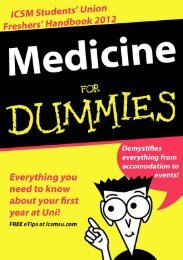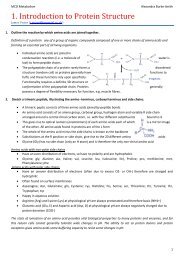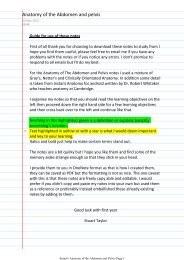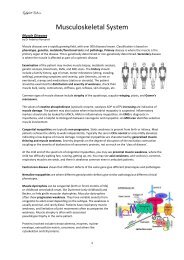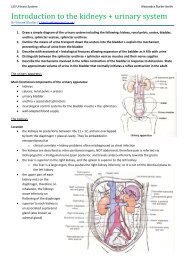1. Introduction to Medical Sociology
1. Introduction to Medical Sociology
1. Introduction to Medical Sociology
Create successful ePaper yourself
Turn your PDF publications into a flip-book with our unique Google optimized e-Paper software.
FOCP Alexandra Burke-Smith<br />
General Household Survey<br />
Sees health as multi-faceted, and measures it through...<br />
� Self report of health and long-standing illness/disability<br />
� Curtailing of normal activities by illness/activity<br />
� Contact with GP or as hospital out-patient<br />
� Number of days treated in hospital<br />
� Use of glasses/contact lens; own teeth; when had eye test; when had dental check.<br />
For >65 years old, health is seen as functional and is measured in terms of...<br />
� general capability (sight, hearing, managing stairs, getting around the house, managing own affairs)<br />
� personal care (getting in and out of bed, dressing & undressing, cutting own <strong>to</strong>enails, washing hands and<br />
face, getting <strong>to</strong> <strong>to</strong>ilet)<br />
� independence within the home (preparing hot meal/ snacks, making cup of tea, washing up, vacuuming,<br />
cleaning inside windows, screwing up <strong>to</strong>ps, standing on a chair)<br />
� mobility outside the home (walking down the road, using public transport, doing household shopping)<br />
Lay perspectives of health include functional ideas i.e. whether a person is able <strong>to</strong> live a normal life and fulfil key<br />
roles. Health ‘taken for granted’ until illness occurs.<br />
NOTE: it is very difficult <strong>to</strong> define health; it is more the impairment/absence of health which is discussed<br />
Key Theoretical Perspectives<br />
� functionalism<br />
- social consensus + stable social systems- with specific roles for each person<br />
- sickness as deviance from this stability<br />
- responsibilities of doc<strong>to</strong>r and patient<br />
� conflict (Marxist) perspectives<br />
- social divisions and conflict<br />
- power of the medical profession<br />
- inequalities in health as product of capitalism.<br />
� interactionist perspectives<br />
- medicine is processes of negotiation and adjustment <strong>to</strong> reach a consensus and res<strong>to</strong>re harmony.<br />
� interpretivist understandings<br />
- how patients experience and understand health and illness<br />
- biographical and cultural contexts<br />
- medicine as processes of interpretation and experiences of the social aspects of illness.<br />
� Feminism<br />
- gendered nature of healthcare systems<br />
- gendered patterns and experiences of illness<br />
- role of women as carers and guardians of the health of others.<br />
� post-structuralism/post modernism<br />
- rejection of grand theory<br />
- interest in discourses; crisis of legitimation; fragmented world; fragmented identity;<br />
- medicine as surveillance<br />
- consumerism<br />
- new understandings of the body<br />
- reflexive response <strong>to</strong> risk.<br />
2



